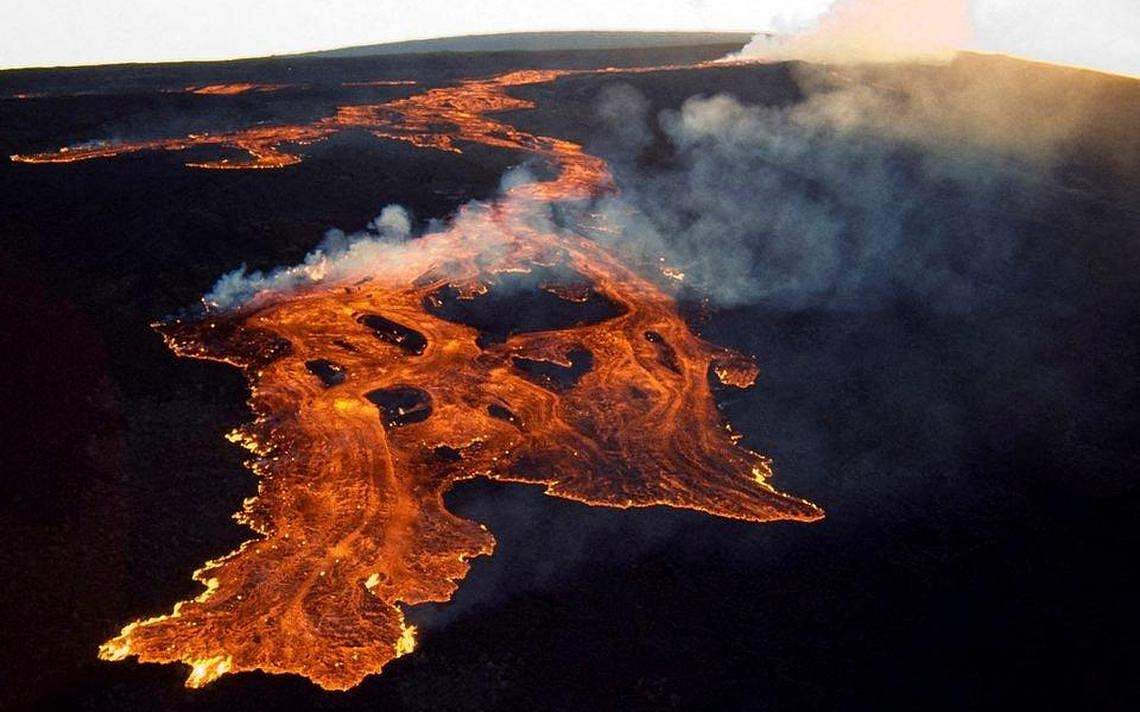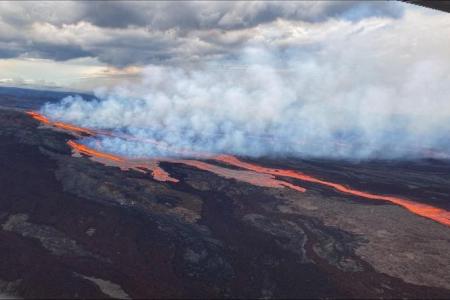World’s biggest volcano, Hawaii’s Mauna Loa, erupts for first time in decades
LOS ANGELES - Hawaii’s Mauna Loa, the largest active volcano in the world, has erupted for the first time in nearly 40 years, US authorities said, spewing lava and ash on Monday as emergency crews went on alert.
Flows of lava remained mostly contained within the summit’s massive caldera, but the eruption could pose a threat to nearby residents should conditions change, the United States Geological Survey reported at 11.45pm local time on Sunday, some 15 minutes after the eruption inside Hawaii Volcanoes National Park.
Mauna Loa has been showing signs of building to an eruption for years, according to the USGS, which said the ongoing eruption was visible from Kona, a town on the west coast of Hawaii’s main island some 72km from the volcano.
“Lava is still erupting from the summit & is overflowing from the caldera,” the USGS said on its website, referring to the basin at the top of a volcano.
While it added there were “no threats to populated areas currently”, it urged area residents to review preparedness procedures.
“If the eruptive vents migrate outside its walls, lava flows may move rapidly downslope,” according to the USGS.
The agency said the Hawaiian Volcano Observatory was in consultation with emergency management personnel and its staff would conduct an aerial reconnaissance over the 4,168-metre volcano as soon as possible.
Hawaii authorities said no evacuation orders have been given, although the summit area and several roads in the region were closed, and two shelters have been opened as a precaution.
An ashfall advisory has been issued for downwind of the volcano, with a light accumulation of ash expected on ships in ocean waters along the Big Island’s southeast.
A USGS webcam on Mauna Loa summit’s north rim showed long bright eruptive fissures within the volcanic crater, contrasted against the dark of night.
Dr Robin George Andrews, a scientist and volcanologist, said a larger threat exists if magma begins to pour out of so-called rift zones along the volcano’s flanks.
While there is no evidence yet of this occurring now on Mauna Loa, “the fact that it is a hazardous mountain that hasn’t erupted since 1984 – the longest eruptive pause in its recorded history – is why we should all keep an eye on it”, Dr Andrews posted on Twitter.

The largest volcano on Earth by volume, Mauna Loa, whose name means “Long Mountain”, covers half of the Big Island and is larger than the rest of the Hawaiian islands combined.
The volcano’s submarine flanks stretch for miles below sea level to the ocean floor, which in turn is depressed by Mauna Loa’s great mass – making its summit some 17km above its base according to the USGS.
One of six active volcanoes on the Hawaiian islands, Mauna Loa has erupted 33 times since 1843, according to USGS.
The last eruption, in 1984, lasted 22 days and produced lava flows that reached within about 7km of Hilo, a city to the northeast which is home to about 44,000 people today.
Kilauea, a volcano on the southeastern flank of Mauna Loa, erupted almost continuously between 1983 and 2019, and a current minor eruption there has been ongoing for months. - AFP
Get The New Paper on your phone with the free TNP app. Download from the Apple App Store or Google Play Store now


